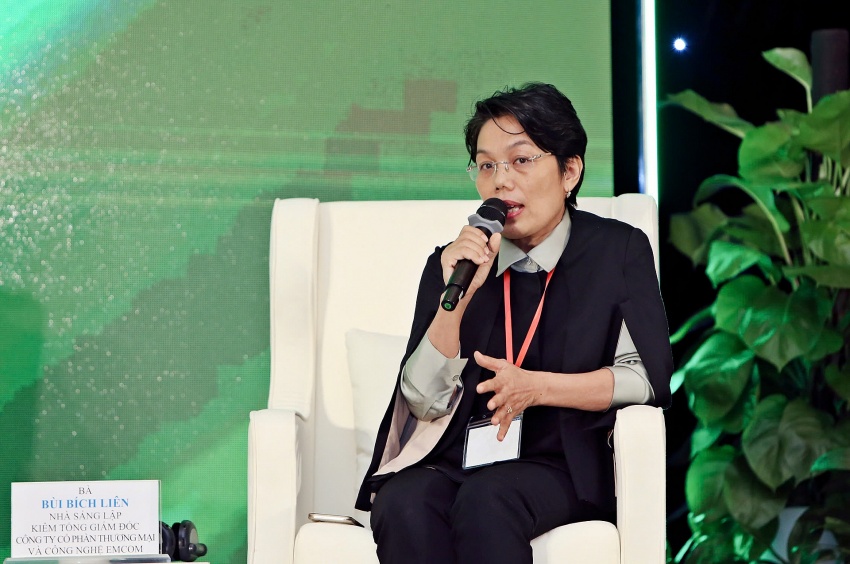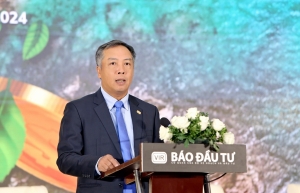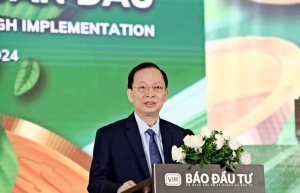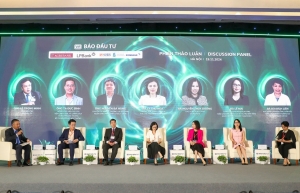SMEs call for genuine support from banking sector
As the only business representative at a seminar hosted by VIR on November 19, Bui Bich Lien, founder and CEO of EMCOM, emphasised that one of the main challenges faced by small- and medium-sized enterprises (SMEs) like EMCOM is funding, as capital is the lifeblood that sustains a business.
 |
| Bui Bich Lien, founder and CEO, EMCOM |
“SMEs like EMCOM do not just need cheap capital, we need support. Beyond criteria for how a business qualifies for loans, there should be criteria to evaluate what contribution the business makes to society. Capital provided by banks should be assessed based on the value it brings. Factors like job creation and green environments are surface-level,” said Lien.
“EMCOM was once excluded from receiving preferential funding because our business, starting small, couldn't meet the criteria. Limited capital makes it difficult for us to reach the community. Therefore, we are looking for support from financial institutions and government bodies. Their collaboration, along with partnerships with other businesses and corporations, will open up better opportunities, even though we lack the resources to develop a research lab.”
Additionally, Lien emphasised that short-term capital or tax incentives contribute only a little to business growth. The long-term, important factors are clear standards and criteria for businesses addressing deeper societal issues and improving the environment. Businesses are confident when they are accepted and supported by society.
“A business that delivers practical and meaningful value not only addresses challenges but also fosters sustainable development. Businesses should choose models that focus on delivering benefits to customers, solve the pain points that businesses can address, and offering products that provide practical solutions for customers,” she said.
Regarding environmental, social, and governance (ESG) practices in businesses, Lien noted that the current requirement for export products to have ESG certification is a significant challenge, especially for small businesses.
“For sustainable direction, businesses should opt for effective business solutions that address issues at their root, not just at the surface level. Green initiatives should not just be for PR purposes but should aim to solve societal problems.”
For example, EMCOM applies Japanese microbial technology to create environmentally safe personal care products, contributing to environmental protection."Just like every person's DNA is unique, each body's microbiome is unique, so its adaptation and issues vary. Addressing these issues directly is very effective in developing sustainable products.”
“I have worked in organic food for eight years, and environmental pollution and waste management in agriculture are particularly challenging and time-consuming. I am fortunate to have access to Japanese microbial technology, which allows us to create new personal care products that are safe for the environment when discharged," shared Lien.
 | VIR hosts 'ESG in Banking: Leading Through Implementation' conference Vietnam Investment Review organized the conference themed "ESG in Banking: Leading Through Implementation" at the Pullman Hotel, Hanoi on November 19. |
 | ESG implementation in banking: from awareness to action Deputy Governor of the State Bank of Vietnam Dao Minh Tu emphasized that increasing ESG implementations requires financial institutions to consistently comply with evolving regulations, demonstrating environmental and social responsibility while enhancing their credibility and transparency. |
 | ESG represents a shift towards sustainability for banks At a seminar on environmental, social, and governance (ESG) factors in the banking sector hosted by VIR on November 19, industry experts assessed that banks have performed exceptionally well in governance, while the environmental and social aspects remain challenging. |
What the stars mean:
★ Poor ★ ★ Promising ★★★ Good ★★★★ Very good ★★★★★ Exceptional
Related Contents
Latest News
More News
- $100 million initiative launched to protect forests and boost rural incomes (January 30, 2026 | 15:18)
- Trung Nam-Sideros River consortium wins bid for LNG venture (January 30, 2026 | 11:16)
- Vietnam moves towards market-based fuel management with E10 rollout (January 30, 2026 | 11:10)
- Envision Energy, REE Group partner on 128MW wind projects (January 30, 2026 | 10:58)
- Vingroup consults on carbon credits for electric vehicle charging network (January 28, 2026 | 11:04)
- Bac Ai Pumped Storage Hydropower Plant to enter peak construction phase (January 27, 2026 | 08:00)
- ASEAN could scale up sustainable aviation fuel by 2050 (January 24, 2026 | 10:19)
- 64,000 hectares of sea allocated for offshore wind surveys (January 22, 2026 | 20:23)
- EVN secures financing for Quang Trach II LNG power plant (January 17, 2026 | 15:55)
- PC1 teams up with DENZAI on regional wind projects (January 16, 2026 | 21:18)

 Tag:
Tag:




















 Mobile Version
Mobile Version